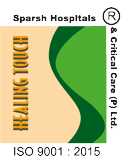Why choose Sparsh Hospitals for Pulmonology?

The Department of Pulmonology at Sparsh Hospitals offers comprehensive care for patients with respiratory disorders. Our team of pulmonologists, respiratory therapists, and critical care specialists are experts in diagnosing and treating conditions affecting the lungs and respiratory system. Utilizing advanced diagnostic tools and innovative treatment methods, we provide personalized care for asthma, chronic obstructive pulmonary disease (COPD), lung infections, and sleep disorders. Our commitment to patient education and preventive care ensures that patients receive the highest quality of care to manage and improve their respiratory health.
What is Pulmonology?
Pulmonology is the branch of medicine that focuses on the respiratory system, including the lungs, airways, and respiratory muscles. Pulmonologists diagnose and treat conditions such as asthma, COPD, pneumonia, tuberculosis, and lung cancer. Pulmonology also covers sleep-related breathing disorders and complex respiratory conditions requiring critical care management.

Common Respiratory Conditions and Treatments
•Asthma: A chronic condition causing inflammation and narrowing of the airways. Treatment includes inhalers, medications, and lifestyle modifications to manage symptoms and prevent attacks.
•Chronic Obstructive Pulmonary Disease (COPD): A progressive disease characterized by airflow obstruction. Management involves bronchodilators, steroids, oxygen therapy, and pulmonary rehabilitation.
•Pneumonia: An infection of the lungs causing inflammation and fluid accumulation. Treatment typically includes antibiotics, antivirals, and supportive care.
•Lung Cancer: A malignancy that requires a multidisciplinary approach involving surgery, chemotherapy, radiation therapy, and targeted therapies.
•Tuberculosis (TB): A bacterial infection treated with a prolonged course of antibiotics and monitored through regular follow-ups.
•Sleep Apnea: A disorder characterized by pauses in breathing during sleep. Treatment options include CPAP therapy, lifestyle changes, and surgical interventions if necessary.
Diagnostic Tests in Pulmonology
•Pulmonary Function Tests (PFTs): Measure lung capacity and airflow to diagnose conditions like asthma and COPD.
•Chest X-rays: Provide images of the lungs to detect infections, tumors, and structural abnormalities.
•CT Scans: Offer detailed images of the chest to evaluate lung conditions and guide biopsies.
•Bronchoscopy: A procedure that allows direct visualization of the airways and collection of tissue samples for analysis.
•Sleep Studies: Diagnose sleep apnea and other sleep-related disorders.
•Arterial Blood Gas (ABG) Analysis: Measures oxygen and carbon dioxide levels in the blood to assess lung function.
Pulmonology Treatments
•Medications: Include bronchodilators, steroids, antibiotics, and antifungals to manage respiratory conditions.
•Oxygen Therapy: Provides supplemental oxygen for patients with severe respiratory distress or chronic lung diseases.
•Ventilatory Support: Mechanical ventilation for critically ill patients in the ICU.
•Pulmonary Rehabilitation: A comprehensive program involving exercise, education, and support to improve lung function and quality of life.
•Surgical Interventions: Procedures such as lung biopsies, resections, and transplantation for advanced lung diseases.

